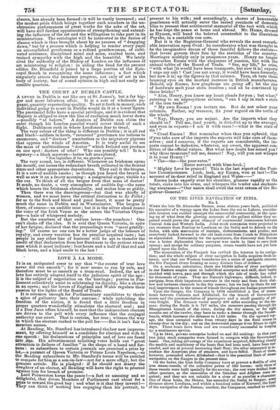LOVE s A LA MODE.
IT in an antiquated error to say that "the course of true love never did run smooth"; for it now seems to run by rule, and therefore must be as smooth as a tram-road. Indeed, the art of love has entirely adapted itself to the judicious spirit of the age : it is the subject of negotiation on the hustings ; partieisin Par- liament collectively assist in celebrating its dignity, like a chorus in an opera • and the lovers of England and Wales regulate their passion by the lights of the Board of Trade. It is common enough for Parliamentary candidates to throw a spice of gallantry into their canvass : while upholding the freedom of the nation, it is found that a little freedom in proper quarters wonderfully stimulates the electoral zeal ; and If a Don Juan offers himself, be sure that the independent electors are driven to the poll with every influence that the conjugal authority can exert. That is curious, but true ; witness the way in which the electors rushed to the poll for—But it isn't fair to Mention names.
At Reading, Mr. Stanford has introduced the last new improve- ment, by offering himself as a candidate for election and wife in one speech : his declarations of principles and of love are fused into eine. His advertisement soliciting votes holds out "great attraction 4, fathers of families" in the shape of a hand and for- tune : as subscribers to certain journals are promised a prize by let,—a portrait of Queen Victoria or Prince Louis Napoleon,—so the Reading. subscribers to Mr. Stanford's terms will be entitled to compete for him as a son-in-law—not for a mere effigy, but the genuine article. He is pledged : if he should not marry the daughter of an elector, all Reading will have the right to proceed itgauxst him for breach of promise. Lord Palmerston keeps the peacel—a fact so amazing and so delightful, that divers Members of Parliament cast about for a E.4ze to reward the good boy : and what is it that they invent?—. They can -think of nothing less engaging than his portrait, to
present to his wife ; and accordingly, a chorus of honourable gentlemen will actually enter the sacred precincts of domestic bliss to present that sentimental memorial of the tact with which he has kept the peace at home and abroad. Mr. Hume, dressed as Hymen, will hand the beloved counterfeit to the illustrious Psyche, in a cantabile con coro.
But it is the Registrar-General who reveals the most remark- able innovation upon Ovid : he corroborates what was thought to be the imaginative dream of those fanciful fellows the statists— that lovers govern their fate by the statistics of the country. Marriages multiply only in prosperous years. Henry no longer approaches Emma with the eloquence of passion, but with the annual tables of the Board of Trade. " See, my life," he cries, "with what [it would have been transports, but now it is] exports I urge my suit ! Cast [me not away, it would have been formerly, but now it is] up the figures in that column. Turn, oh turn those beaming eyes on the marked increase in British manufactures. Behold, my Emma, how gingham's are going off ; let the rise of hardware melt your stern resolves ; and oh be convinced by those bricks! "
"Alas, Henry, you know my heart pleads for you ; but what," pointing to an unpropitious column, can I say in such a state of the iron trade?'
"My My own Emma! you torture me. But do not select your columns. Rather, my treasure, fix your regard on the tattle of the whole."
"Nay, Henry, you are unjust. Are the imports what they should be? Tell me, fond youth, is divi-divi up to the average; and even in exports—/ ask it with tears !—what is the state of tin ? "
"Cruel Emma! But remember when thus you upbraid, that if you take care of the imports the exports will take care of them. selves ; and e masers°, if the exports are considerable, the im- ports cannot be defective, whatever, my sweet, the apparent con- dition of the official values. But what new doubt has seized you ? why these tremouret tell me, dearest! Nay, will you not whisper it to your Henry ? "
"The—the—the poor-rates." [Enter servant with blue-book.] "Mighty Love he praised ! This is the last report of the Poor- law Commissioners. Look, look, my Emma, won at last!—The account of in-door relief in England and Wales—" Emma looks eagerly over his shoulder, glances rapidly at the totals, sinks into his arms, and whispers the tender and enchant- ing assurance—" Our union shall swell the next return of the Re- gistrar- General."


























 Previous page
Previous page